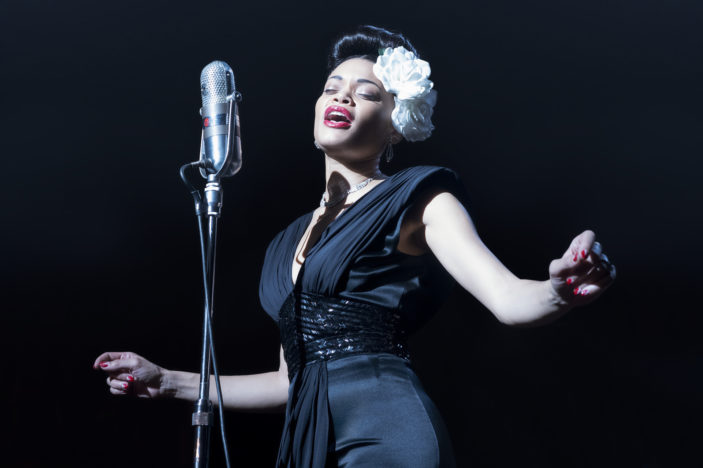
The best performances within the biopic genre are those that aren’t just simply imitations or impressions of the subject at hand, but an honest appraisal of the person, one where the performer vanishes on screen.
And so often with such grand performances, it can lead to the rest of the film surrounding them to feel outshone. Such is the case with The United States vs. Billie Holiday. Not a bad film by any means – even though there’s tonal inconsistencies and a sense that several characters or narrative strands were victims of the editing room – but whatever sins the film commits are forgiven thanks to the stunning central turn from Andra Day.
As the titular Holiday, Day is absorbed by the spirit of the late jazz great, with her appearance and vocal pattern a perfect emulation. She’s simply magnetic. And not just when she’s singing either – although that in itself is a stunning experience – but as an actress, Day is never less than incandescent in a flawless performance that understandably netted her this year’s Golden Globe for Best Dramatic Actress.
When Lee Daniels‘s thematically heavy feature begins, Billie Holiday is already established in her career – those looking for her beginnings best look elsewhere – with the film essentially bookended by Billie recounting her troubles with the law and her struggles with drug addiction to Reginald Lord Devine (a fabulously wigged Leslie Jordan), a reporter of sorts who’s trying to keep his conversation as informative as he is salacious.
Billie’s angelic vocals – pipes that have brought together people of all races and status – can’t entirely hide the demons that plague her personally, with her heroin addiction something of an open secret, whilst her taste in men often leads to a cycle of abuse she’s unable to escape; some of the film’s more unpleasant moments are graphic iterations of these particular flaws.
Her drug abuse is ultimately what the Federal Government zone in on in their bid to silence her, even though it’s one of her songs – the haunting “Strange Fruit”, a protest song depicting the lynchings of Black Americans – that they truly take issue with. Arresting someone on the basis of a song won’t exactly fly though, so government official Harry Anslinger (Garrett Hedlund), head of Narcotics (and a racist to boot), does all he can to utilise her drug habit for his personal gain.
The Suzan-Lori Parks script (based off Johanm Hari‘s “Chasing the Scream: The First and Last days of the War on Drugs”) is one that oft incites rage throughout, but as much as it presents statistics that are sickening, it also can’t help but feel like an unfinished product of a larger story with certain narrative arcs and characters appearing as casualties of relative running time; Holiday’s stint in prison, her apparent ease at returning to disappeared exes, her more-than-friendship with actress Tallulah Bankhead (Natasha Lyonne), and the dynamic of her relationship with undercover agent-turned-love interest Jimmy Fletcher (Trevante Rhodes) just some of the most evident inconsistencies.
Fluctuating it may be, it’s evident how much Daniels cares for his subject, unafraid to show her flaws but also the revelling of her talent in spite of her self-destruction. Whilst not the quintessential “Lady Day” biopic that perhaps the singer deserves however, The United States vs. Billie Holiday is nonetheless an unforgettable experience, solely due to Day’s masterful movie-star-in-the-making performance at its core.
![]()
![]()
![]()
![]()
![]()
THREE STARS (OUT OF FIVE)
The United States vs. Billie Holiday is screening in Australian theatres from April 22nd, 2021
